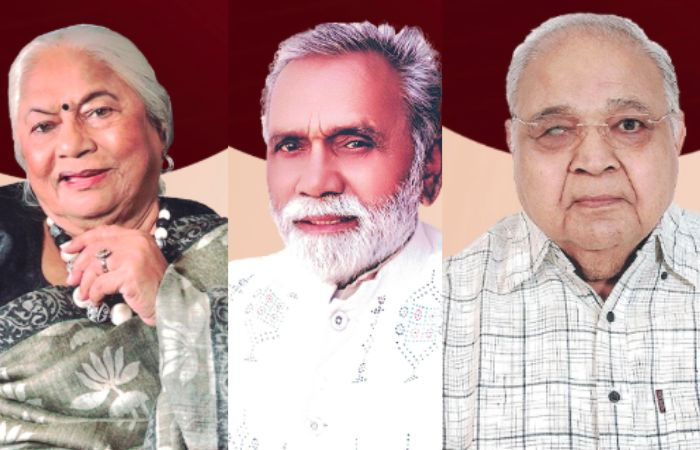In a grand ceremony at Rashtrapati Bhavan on Tuesday, President Droupadi Murmu gave Padma Awards to 69 people for their outstanding work in areas like art, literature, education, public service, medicine, social work, science, sports, and industry.
Ahmedabad’s grand old Kathak maestro, Kumudini Lakhia, who passed away last month was conferred with Padma Vibhushan on Tuesday.
Among those honoured in this phase were 3 Padma Vibhushan, 9 Padma Bhushan, and 57 Padma Shri awardees.
Other two Gujaratis in the list of 69 recipients were Ahmedabad-based Ram Mandir architect Chandrakant Sompura and weaver Lavjibhai Parmar.
Kathak maestro
Kumudini Lakhia (Posthumous) honoured with Padma Vibhushan for her contributions to the field of Art. Ahmedabad’s very own Lakhia was a renowned Kathak dancer whose career spanned over 75 years. She founded the Kadamba Dance Centre in Ahmedabad and reinvented Kathak on the global stage. She passed away at the age of 95 on April 12, 2025.
The temple mystic
Ahmedabad-based architect Chandrakant Sompura, known for his work in temple architecture including projects like Shree Ram Janmbhoomi Mandir in Ayodhya, Ambaji Temple in Palanpur, Akshardham Temple in Gandhinagar was conferred the Padma Shri, India’s fourth-highest civilian award, for his contribution in the field of architecture.
Legacy & tradition
Lavjibhai Nagjibhai Parmar has devoted more than four decades to preserving Gujarat’s 700-year-old tradition of Tangaliya – a hand-weaving technique native to the Dangasia community of Surendranagar.
Other Gujarati Padma recipients of 2025
| Name | Award | Field |
|---|---|---|
| Kumudini Rajnikant Lakhia (Posthumous) | Padma Vibhushan | Art |
| Pankaj Patel | Padma Bhushan | Trade & Industry |
| Chandrakant Sheth (Posthumous) | Padma Shri | Literature & Education |
| Chandrakant Sompura | Padma Shri | Others – Architecture |
| Parmar Lavjibhai Nagjibhai | Padma Shri | Art |
| Ratan Kumar Parimoo | Padma Shri | Art |
| Suresh Harilal Soni | Padma Shri | Social Work |
Tuesday’s Padma event was attended by Prime Minister Narendra Modi, Home Minister Amit Shah, External Affairs Minister S Jaishankar, and other dignitaries, marking the second phase of the Padma Awards ceremony for the year 2025.
The Padma Awards, among the highest civilian honours of India, are conferred in three categories: Padma Vibhushan, Padma Bhushan, and Padma Shri. This year, the government had announced a total of 139 Padma awardees on the eve of Republic Day.
One of the most emotional moments of the event was the posthumous conferral of the Padma Vibhushan to late Bhojpuri and folk singer Dr Sharda Sinha, whose music resonated deeply with the Indian heartland. Her son, Anshuman Sinha, received the award on behalf of the legendary folk singer, renowned for her devotional and Chhath songs.
Other recipients of the Padma Vibhushan included former Chief Justice of India Jagdish Singh Khehar and classical dancer Kumudini Lakhia (posthumous).
The Padma Bhushan awardees included social activist Sadhvi Ritambhara, known for her role in the Ram Janmabhoomi movement, actor-politician Nandamuri Balakrishna, and celebrated journalist and author A. Surya Prakash. Among the posthumous Padma Bhushan recipients were legendary singer Pankaj Udhas, veteran politician Manohar Joshi, economist Bibek Debroy. Renowned Malayalam writer MT Vasudevan Nair, and Osamu Suzuki, the Japanese industrialist known for his pivotal role in Suzuki’s partnership with India.
The largest share of honours came under the Padma Shri category, with 57 individuals recognised for their grassroots and innovative contributions across the country. Prominent names include playback singer Arijit Singh, cricketer R Ashwin, author Pratibha Satpathy, former SBI Chairperson Arundhati Bhattacharya, and violinist Tejendra Narayan Majumdar. The list also included foreign nationals, NRIs, PIOs, and OCIs—ten in total—reflecting India’s acknowledgement of global contributions.
Notably, 23 of the awardees are women, showcasing the growing recognition of female excellence in various sectors. The Padma Awards continue to honour unsung heroes—many of them from remote regions—who have made significant contributions without seeking the limelight.
This year’s ceremony reaffirms the spirit of “nation first, people first”, with awardees reflecting India’s cultural, scientific, and humanitarian diversity. The government’s efforts to democratise the Padma Awards have made them a true people’s honour, celebrating not just fame, but meaningful service.



